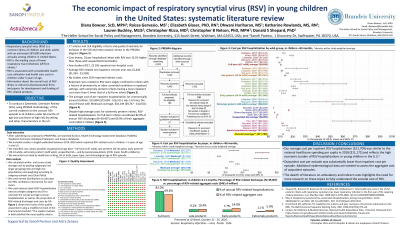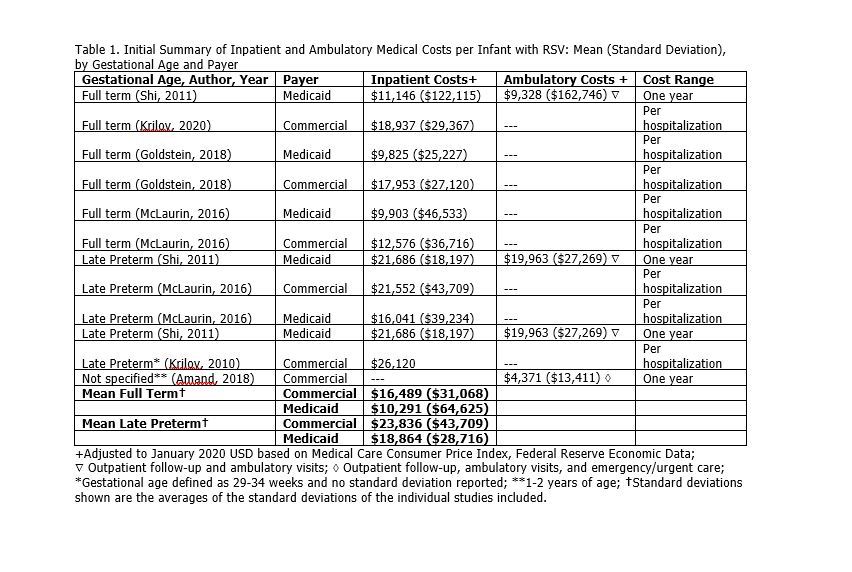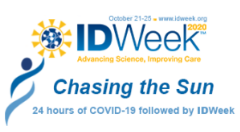Category: Respiratory Infections - Viral
Poster Session: Respiratory Infections - Viral
1526 - The economic impact of respiratory syncytial virus (RSV) in infants in the United States: systematic literature review


Diana Bowser
Associate Professor
Brandeis University
Waltham, MassachusettsDisclosure: I do not have any relevant financial / non-financial relationships with any proprietary interests.
- RG
Reissa Gervasio
Student
Brandeis University
Waltham, MassachusettsDisclosure: I do not have any relevant financial / non-financial relationships with any proprietary interests.
- EG
Elizabeth Glaser
Student
Brandeis University
Waltham, MassachusettsDisclosure: I do not have any relevant financial / non-financial relationships with any proprietary interests.
- DH
Dhwani Harihan
Student
Brandeis University
Waltham, MassachusettsDisclosure: I do not have any relevant financial / non-financial relationships with any proprietary interests.
- KR
Katie Rowlands
Student
Brandeis University
Waltham, MassachusettsDisclosure: I do not have any relevant financial / non-financial relationships with any proprietary interests.
- LB
Lauren Buckley
Student
Brandeis University
Waltham, MassachusettsDisclosure: I do not have any relevant financial / non-financial relationships with any proprietary interests.
- CR
Christopher Rizzo
Senior Medical Director
Sanofi
Swiftwater, PennsylvaniaDisclosure: I do not have any relevant financial / non-financial relationships with any proprietary interests.

Christopher B. Nelson
Associate Vice President
Sanofi
Swiftwater, PennsylvaniaDisclosure: I do not have any relevant financial / non-financial relationships with any proprietary interests.
Presenting Author(s)
Co-Author(s)
Background:
Respiratory syncytial virus (RSV) is a human orthopneumovirus spread by direct contact with symptomatic, infected individuals. An estimated 587,000 RSV LRTIs result in inpatient or outpatient encounters annually among US infants (Rainisch et al 2019). The health care costs associated with RSV include medical costs to insurers, governments, and households, travel, and loss of wages. |

Methods:
A systematic literature review of the costs associated with children who have RSV was conducted. Following PRISMA methodology, key search terms were searched within article titles and abstracts through PubMed, EconLit, and Scopus. A total of 1,942 unique abstracts were screened independently by two authors and reduced to 180 articles after applying inclusion and exclusion criteria. The number of included articles after reviewing the full text was 66. Costing results were adjusted to USD2020 based on the Medical Care Consumer Price Index. |
Results:
Costing results were reported mainly for medical costs in inpatient settings. Initial results show that annual mean inpatient costs per RSV patient range among individual studies from $9,825 (SD=$25,227) for full term infants to $26,120 (SD unspecified) for late preterm infants (Table 1). Costing results vary by gestational age, with late preterm infants having an annual mean inpatient cost almost 1.6 times that of a full term infant. Inpatient costs for RSV infants are higher for commercial pay versus Medicaid, for both full term infants (commercial mean=$16,489 SD=$31,068, Medicaid mean=$10,291 SD=$64,625) and late preterm infants (commercial mean=$23,836; SD=$43,709, Medicaid mean=$18,864 SD=$28,716). Annual RSV ambulatory costs per infant vary between $4,371 (SD=$13,411) and $19,963 (SD=$27,269), depending on gestational age. Other relevant RSV costs include preventative drug costs, such as palivizumab (average $11,954 per infant). |
Conclusion:
The literature describes the economic impact of RSV primarily for hospitalization of children with underlying comorbidities. There is a need to better understand costing results for RSV, including the burden in ambulatory settings and indirect costs to families affected. |

